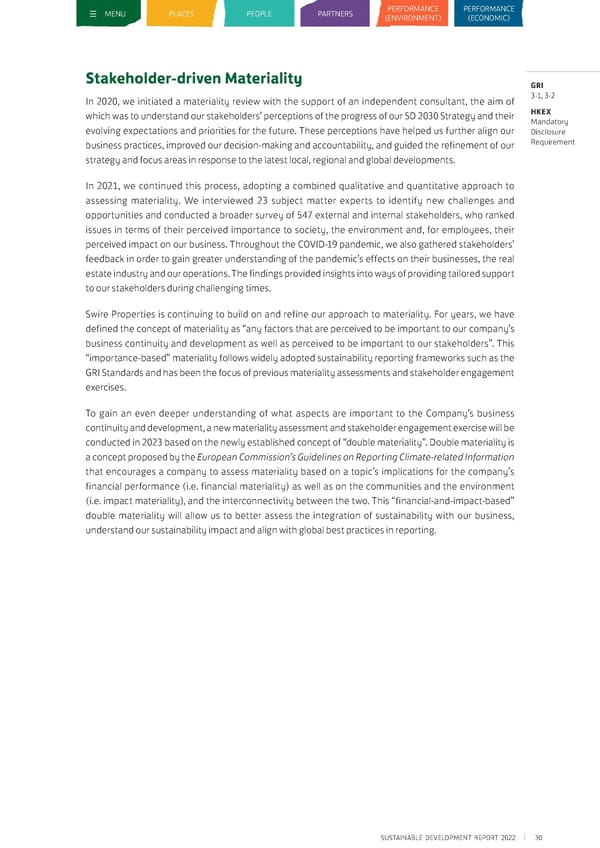MENU PLACES PEOPLE PARTNERS PERFORMANCE PERFORMANCE (ENVIRONMENT) (ECONOMIC) Stakeholder-driven Materiality GRI In 2020, we initiated a materiality review with the support of an independent consultant, the aim of 3-1, 3-2 which was to understand our stakeholders’ perceptions of the progress of our SD 2030 Strategy and their HKEX evolving expectations and priorities for the future. These perceptions have helped us further align our Mandatory Disclosure business practices, improved our decision-making and accountability, and guided the refinement of our Requirement strategy and focus areas in response to the latest local, regional and global developments. In 2021, we continued this process, adopting a combined qualitative and quantitative approach to assessing materiality. We interviewed 23 subject matter experts to identify new challenges and opportunities and conducted a broader survey of 547 external and internal stakeholders, who ranked issues in terms of their perceived importance to society, the environment and, for employees, their perceived impact on our business. Throughout the COVID-19 pandemic, we also gathered stakeholders’ feedback in order to gain greater understanding of the pandemic’s effects on their businesses, the real estate industry and our operations. The findings provided insights into ways of providing tailored support to our stakeholders during challenging times. Swire Properties is continuing to build on and refine our approach to materiality. For years, we have defined the concept of materiality as “any factors that are perceived to be important to our company’s business continuity and development as well as perceived to be important to our stakeholders”. This “importance-based” materiality follows widely adopted sustainability reporting frameworks such as the GRI Standards and has been the focus of previous materiality assessments and stakeholder engagement exercises. To gain an even deeper understanding of what aspects are important to the Company’s business continuity and development, a new materiality assessment and stakeholder engagement exercise will be conducted in 2023 based on the newly established concept of “double materiality”. Double materiality is a concept proposed by the European Commission’s Guidelines on Reporting Climate-related Information that encourages a company to assess materiality based on a topic’s implications for the company’s financial performance (i.e. financial materiality) as well as on the communities and the environment (i.e. impact materiality), and the interconnectivity between the two. This “financial-and-impact-based” double materiality will allow us to better assess the integration of sustainability with our business, understand our sustainability impact and align with global best practices in reporting. SUSTAINABLE DEVELOPMENT REPORT 2022 30
 Sustainable Development Report 2022 Page 30 Page 32
Sustainable Development Report 2022 Page 30 Page 32